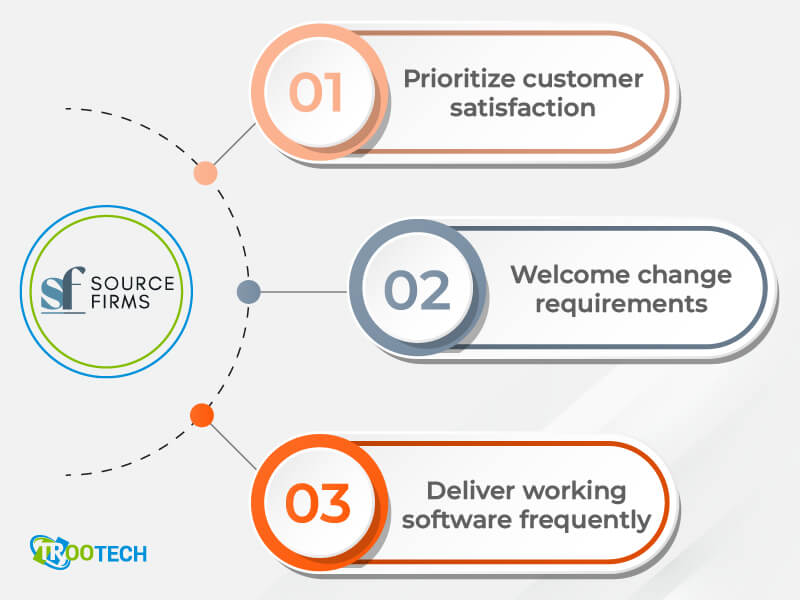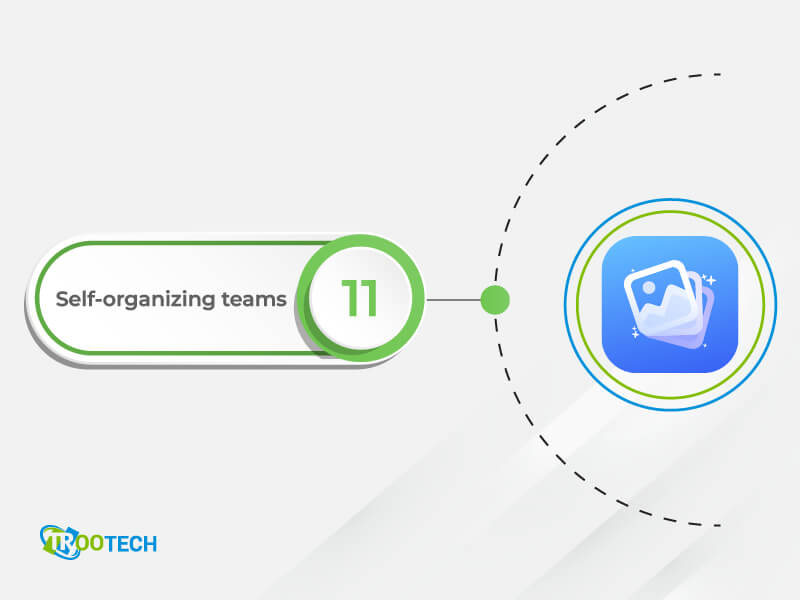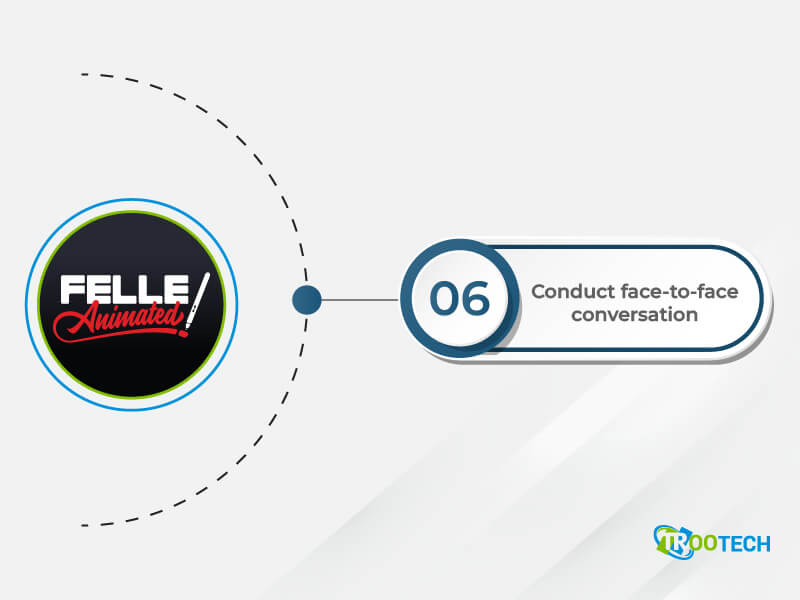
In today's fast-paced business landscape, the rapid evolution of technology has left many developers questioning the relevance of Agile Manifesto values and principles. However, through practical experimentation, the resounding answer seems to be a simple "YES!"
The Agile Manifesto, with its 12 principles and 4 key values, continues to hold significant relevance in the present day. But why?
Let's explore further.

Well, with Agile Manifesto principles and values by your side, you are empowered with project visibility, better client satisfaction, faster review cycles, quicker time-to-market, and even more.
So, for the Agile Manifesto that has been seamlessly serving businesses over various projects across a couple of decades, let’s catch up with its base.
Sliding to the times of the 1990s, businesses realized that the Waterfall model and other conventional approaches were not enough. This was because business requirements and customer needs got hit by advancements and changes, making it difficult for developers to reach project deadlines.
This led to 17 tech experts meeting in Utah and discussing the overall future of software development. The Utah meeting amidst the scenes of Wasatch Mountains, in Snowbird, then gave birth to a formally written 12 Agile Manifesto Principles.
Hopping back to the relevance of the Agile Manifesto, we know that it’s finely practical in business at the current date, but what about tomorrow?
With technological advancements being heavily poured onto businesses nowadays, is the Agile Manifesto at risk of getting outdated?
Keep scrolling to get the answers.
Will Agile Manifesto Find a Place in the Future?
One of the remarkable aspects of the Agile Manifesto is its resilience in the face of technological transformations across industries. Its flexible and adaptable nature positions it as a perfect fit for businesses even in the future.
Despite the ever-changing landscape of industries, Agile Manifesto principles have proven to be deeply ingrained in companies, expanding far beyond their original scope.
Agile Manifesto for All Process Stages!
The Agile Manifesto isn't just about specific processes; it's a mindset. With its focus on principles and values, it serves as a guiding light for teams at every stage of the process.
Whether you're defining product vision, creating a product roadmap, planning releases, scheduling iterations, or conducting daily standups, Agile is there to support you every step of the way.
Check this in detail –
- Product Vision: An ideation stage is the first step in every productive Agile software development project.
The Agile product owner constructs the project's ideology in close collaboration with stakeholders, the management staff, developers, and the app's intended users by outlining the function and objective of the new software, identifying and capturing business and user specifications, setting priorities, and assigning resources. - Product Roadmap: Teams can begin developing the initial iteration of the program after conceptualization.
All relevant production tasks, such as UI/UX designing, architecting, and programming, are included in the development stage. The initial iteration of a software product's development is typically the phase of the Agile application development lifecycle that takes the most. - Release Planning: This step declares the product is all set to launch.
Although the QA team stands aligned to undertake relevant tests to ensure the software functionality.
Hence, quality control must be carried out first, though, before it may be published. The Agile team reviews the code for cleanliness, fixes bugs and mistakes, and executes test versions of the app to confirm that it functions fully. The Agile team publishes the software to a cloud or on-premise server once it becomes ready for launch. - Iteration Planning: Herein, the teams commit to providing many product backlogs during iteration planning. At the time of iteration planning, the entire team decides what percentage of the team backlog they can devote to completing in the next iteration. The work is compiled by the team into a list of agreed Iteration Goals.
- Daily Standup: Pushing the magic button advances the work. Regular upkeep aids in removing bugs and preserving functionality. There will be possibilities to gather input and make modifications that can be included in upcoming revisions of the app as people interact with it.
Yes, the Manifesto of Agile is bound to stay sustainable in the game, provided its underlying principles are solid and in line with what businesses require to thrive and endure.
And what is that?
Well, the capacity to make decisions more quickly and to drive efficiency while upholding quality standards and complying with legal obligations.
Agile Manifesto is not a magical formula that causes all of this to take place quickly, but it is unquestionably a component of the solution.
Although, businesses will inevitably alter and evolve as they embrace Agile Manifesto values and principles, across various roles, hierarchies, divisions, and functional areas. Even while it will possess its application and interpretation, it will still be Agile.
Agile Manifesto Principles Can Stand The Time!
This brings us to ultimately gather that Agile is nowhere fading away, but is not continuing to be the same either. It is evolving, just as the processes are.
It can and ought to extend past conventional development teams to make this easier for the other divisions of the company to change the trajectory of projects. This will eventually lead to a much more efficient and streamlined process.
Agile Manifesto values can be seen in this light as an increasingly team-centered approach that incorporates all team members and connects stakeholders and teams alongside. This is ideal for creating a transparent culture and a way of working where all souls are mindful of their responsibilities.
Not Like The Conventional Waterfall Approach!
Let us outline this in detail for your better understanding!
When compared with the Waterfall approach, Agile is a very adaptable strategy that permits modifications to the project development needs even after the preliminary planning is finished.
On the other hand, the Waterfall methodology leaves no room for altering the project requirements once the development begins. The Agile Manifesto principles enable even the Test teams to participate in seamlessly changing and evolving the project requirements.
Yes! Agile Manifesto Finds a Place in the Future
Having known these points, it could be rightly stated that the Agile Manifesto has a seat reserved in future businesses. And why not? It is a well-thought philosophy in itself that the teams have used for ages even unknowingly, and are set to employ the same in a systematized aware manner in the years to come.
Working on projects with Agile Manifesto principles can make tasks simpler. Our team does exactly that for your business so that you do not face any hurdles.
Planning to start a project?
The TRoo Agile Experience - What value did the Agile Manifesto bring to TRooTech?
Having understood the relevance of the Agile Manifesto for the present and its importance for the future, it’s time now to get a glance over its real-life examples.
Here, we present to you how TRooTech employed the Agile Manifesto principles for its various initiatives and got the desired results:
Project 1: Sourcefirms
Focused Agile Manifesto Principles:
⇒ Primarily considering reassurance to our clients with prompt and continual delivery of custom-made software.
⇒ Receiving changes in business requirements from the client’s end even at any later stage of development. Hence, empowering the customer with a competitive edge in the market.

⇒ Rolling out the maximum possible changes at the project’s initial stage while also considering the minute requirements of the client.
Project Scenario:
In the discussed Sourcefirms project, we were faced with a critical situation. Herein, we were still working at the initial stage of the project, and a maximum number of changes were required to be implemented.
Additionally, we were also required to consider and implement even the minute needs presented by the client at any point in time.
Favorable Outcomes:
Check out how TRooTech inculcated these principles of the Manifesto for Agile software development into their Sourcefirms project to drive increased adaptability and customer satisfaction:
- Our team members worked on their toes to instantly consider and implement any single business requirement change provided by the client. This helped us deliver the client the desired functionality for the software.
- For any addressed problem, we offered an instant solution irrespective of the project’s stage of development. Hence, assuring the client of a well-competent software solution.
- We followed a thorough ‘user-focused’ approach. This allowed us to prioritize customer satisfaction by implementing any and every change asked by the client.
Project 2: Booster Application

Focused Agile Manifesto Principles:
⇒ Placing the foundation of self-organizing teams that drive collectively to offer the ideal designs, architectures, and needs on an overall basis.
Project Scenario:
For the Booster Application project, the best implementation of the Agile manifesto came in handy to keep the team fully motivated for the work.
Hence, enhancing their overall task performance. This required having a one-on-one conversation with any demotivated employee to understand any personal or professional concerns. Thereby, achieving equilibrium and outcomes simultaneously.
Favorable Outcomes:
Let’s explore the way TRooTech implemented this very principle of Manifesto for Agile software development to bring in the element of increased alignment in the Booster Application project -
- We emphasized having robust internal communication within the team. This included having in-person meetings and discussions to find out if or not all the team members were rejoicing in their work. This ensures that all team members are highly motivated to deliver the task accurately and promptly.
- We curated unique approaches to ensure that all team members stay extremely motivated to perform their tasks and deliver quality work.
Project 3: Felle Animated
Focused Agile Manifesto Principles:
⇒ Emphasizing face-to-face communication whenever and wherever possible. The reason is, that in-person conversations ensure that the information is conveyed effectively.

⇒This Agile Manifesto principle ensures that the entire team can seamlessly connect over a daily meeting to discover any challenges and dependencies faced by any team member.
Project Scenario:
Felle Animated brought TRooTech to a scenario that required initiating and maintaining the pattern of in-person communication which is considered to be one of the excellent ways of conveying information.
Favorable Outcomes:
Discover how TRooTech practices this principle of Manifesto for Agile software development in the Felle Animated project to inculcate increased visibility amongst the team members -
- With the prime focus on developing transparency amongst the team members, TRooTech prioritizes in-person communication whenever possible.
- We have inculcated such a comprehensive system where all the team members can view the real-time status of the project and activity levels.
- The team conducts a scrum meeting daily. This helps all the team members gain a clear idea of what each team member is up to and what’s in their pipeline.
- To manage the hybrid working system and sometimes remote working, online meetings are conducted to ensure team coordination.
Agile Manifesto As Your Roadmap To Success Today and Tomorrow!
What could be a better way to understand this than deciphering our real-life use cases?
We already saw that TRooTech implemented many of the Agile Manifesto principles across various projects and gained desired results such as:
- Better Adaptability: TRooTech achieved the benefit of better adaptability by implementing the Agile Manifesto values. It helped by dissecting the dependencies and intricacy of how TRooTech as a company operates. In such a case, iterative development is a technique used by Agile teams to plan and finish work in tiny increments.
- Optimum Customer Satisfaction: The Agile Manifesto helped us prioritize continuous interactions with clients and decipher the challenges they are looking to address. Hence, delivering the optimum level of satisfaction to its customers.
- High-Level Alignment: The Manifesto of Agile and its principles helped us to operate as self-organizing, autonomous teams. It directed TRooTech to provide for early and continuous delivery, thus also aiding high-level alignment.
- Increased Visibility: Increased visibility is such a merit of the Agile Manifesto that helped all our team members understand how their timely and quality completion of tasks matters for the bigger picture. Thereby, also boosting the morale of the employees.
Agile Manifesto: An Ideal Guide to Your Business
Businesses that began small generally wish to grow the Agile development approach to even more products if Agile teams regularly provide high-quality output. With the help of the Agile Manifesto principles, many teams can concentrate on a single product release or a portfolio of releases at once.
With the aid of an Agile delivery solution that streamlines Agile techniques and speeds up delivery, these teams can coordinate the planning and implementation of their tasks. Agile teams can keep on self-organizing and working together to accomplish product goals even at scale.
The best way to scale Agile is for businesses to use it irrespective of how big or complicated the project is. Small teams, brief iterations, quick user feedback, value-based business priorities, and including users in need of refinement are all examples of effective approaches.
Agile Manifesto principles are durable because of the underlying ideals and tenets that shape how people collaborate. Agile teams will more likely prosper when they unite in organizations of all sizes if they emphasize engagement, regular participation, individual motivation, face-to-face conversation, self-organization, and continual enhancement.
Agile Manifesto Lands A Wide Scope in the Future
Clients, instructors, and Agile advocates claim that Agile is still as innovative and successful as it was in its inception. The Agile Manifesto seems to have become the cornerstone of every project as it promotes an emphasis on the demands of the customers.
Even though it is possible that the software industry was the first to truly adopt this framework, other sectors have since followed suit and embraced the Agile technique.
Agile Manifesto values are not overly difficult, you will still need some technical counseling. That being said, the Agile Manifesto contains values and guiding principles that you can adhere to by using various software products available in the market.
Recognized as a reputable software development company, TRooTech uses the Agile Manifesto principles throughout the software development lifecycle. If you want to include the Agile technique into your development cycle but are unsure where to start, we are your one-stop platform. To learn more about Agile software development, you can contact us and discuss your needs.
Working on large projects means also facing bigger problems in the process. Our solutions are customized for every project in all industries.
FAQs
The Agile Manifesto is a set of values and principles that prioritize iterative development, collaboration, flexibility, and customer satisfaction in software development. It emphasizes individuals and interactions over processes and tools, working software over comprehensive documentation, customer collaboration over contract negotiation, and responding to change over following a plan.
It's important because it provides a foundation for teams to deliver high-quality software that meets the evolving needs of stakeholders in a fast-paced environment.
Agile Manifesto principles help teams be flexible by breaking the project into small steps and getting feedback from people involved often. They welcome changes during the process. By regularly showing what's been done, teams can quickly adjust plans based on new needs, market trends, or feedback. This way, they can adapt their work easily, making the project more responsive and flexible.
Collaboration is a central tenet of Agile software development according to the Agile Manifesto.
It emphasizes the importance of individuals and interactions over processes and tools and values customer collaboration throughout the development process. By fostering close collaboration between cross-functional teams, stakeholders, and customers, Agile methodologies promote shared understanding, collective ownership, and continuous improvement, ultimately leading to better software outcomes.
Agile Manifesto principles promote continuous improvement by encouraging reflection, adaptation, and learning throughout the development process. By emphasizing individuals and interactions, Agile methodologies create an environment where teams are empowered to experiment, learn from their experiences, and make adjustments to improve their processes and outcomes.
TRooTceh stands out as a premier software development company that deeply values the principles of the Agile Manifesto. Our commitment to Agile methodologies ensures that we deliver high-quality software that meets your evolving business needs with unmatched speed and efficiency.


